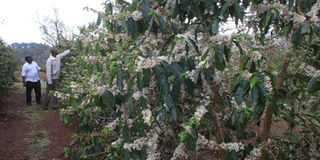Kenya’s coffee production set to increase, says official

Farmers inspect a flowering coffee farm in Nyeri on November 20, 2016. The crop cycle is set to change following the three-month delay in flowering attributed to climate change. PHOTO | JOSEPH KANYI | NATION MEDIA GROUP
What you need to know:
- According to Interim Director in the Agriculture and Food Authority (AFA) coffee Directorate Grenivile Miili the provision of subsidised fertilizer to farmers has increased yields hence the enlargement of area under cultivation by farmers.
- About 800, 000 smallholder farmers are affiliated to 500 cooperative societies in the country and 4, 000 plantations are involved in coffee production which draw the livelihood from coffee earnings.
Coffee production is set to increase to 47, 000 MT this year compared to 45, 000 MT last year due to an expanded plantation area, a coffee directorate official has said.
According to Interim Director in the Agriculture and Food Authority (AFA) coffee Directorate Grenivile Miili the provision of subsidised fertilizer to farmers has increased yields hence the enlargement of area under cultivation by farmers.
“The land under coffee production has increased from 109,000 hectares to 114,000 hectares,” he said.
Farmers earned more than Sh23 billion in 2015/2016 coffee year from a total production of 45, 000 MT up from Sh22.3 billion achieved in 2014/2015.
In addition, he said there were strategies in place to increase the area under coffee to 130, 000 hectares by 2020 through implementation of the integrated coffee production and productivity initiative (ICPP).
The project targets 21 Counties, both in coffee emerging and traditional coffee zones for expansion of hectares under coffee.
“This will raise the production from the current 42,038 metric tonnes clean coffee achieved in 2014/15 coffee year to 92,000 MT by 2020,” he said.
About 800, 000 smallholder farmers are affiliated to 500 cooperative societies in the country and 4, 000 plantations are involved in coffee production which draw the livelihood from coffee earnings.
“Due to the industry’s effective forward and backward linkages it is currently contributing about 0.2 per cent to the GDP and eight per cent to the agricultural sector,” said Mr Miili adding that it contributes 30 per cent of employment in the agricultural sector.
The country sells off its coffee to more than 30 countries around the world where Germany, United States, Belgium, Canada being the leading off takers of coffee.
Mr Miili said AFA was currently seeking to diversify export markets of the cash crop which is most traded in the country next to oil.
He said through the supply to United Kingdom had significantly dropped for the last six years, supply to France and Korea has doubled since 2009 accounting to 78 per cent of exported coffee.





